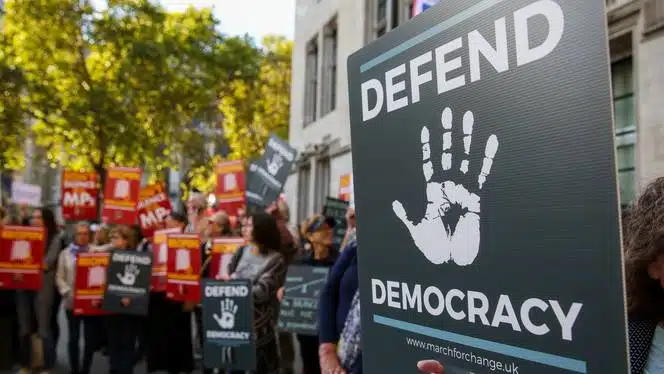Anglican clerics issued a statement saying, “Our leaders should…pursue policies that bring us together, not risk driving us apart.”
Concern has been expressed over the British government’s new anti-extremism plan, with many claiming that the contentious action runs the possibility of “disproportionately targeting Muslim communities.”
Concern has already been raised in Britain regarding a government decision that is anticipated to be disclosed later this week, given that the ruling Conservative Party is already under criticism over racism-related charges.
Using parliamentary privilege, Levelling Up Secretary Michael Gove aims to identify specific organizations that “undermine British democracy.”
“This is in response to the fact that in recent months, we’ve seen an unacceptable rise in extremist activity, which is seeking to divide our society and hijack our democratic institutions,” the Office of the Prime Minister stated on Monday.
It followed the disruption of Prime Minister Rishi Sunak’s speech at Downing Street in early March, during which he discussed a “surge in extremist activities” in the United Kingdom.
He made reference to the nationwide pro-Palestine marches when he remarked, “On too many occasions recently, our streets have been hijacked by a small group…who are hostile to our values and have no respect for our democratic traditions.”
“Choosing favorites”
Despite being seen as peaceful by many, the demonstrations, which have been held since October 7 of last year to demand a ceasefire in Gaza, were dubbed “hate marches” by politicians, including then-Home Secretary Suella Braverman.
Politicians are focusing on the marches even though very few demonstrators are being taken into custody.
Braverman faced backlash after calling immigration a “invasion” and making the untrue assertion that child grooming gangs in the nation were “almost all British-Pakistani.”
She was let off in a Cabinet reshuffle in November following a dispute over her divisive comments on pro-Palestinian demonstrations and her much criticized article in The Times newspaper.
She claimed in the piece that the Metropolitan Police was “playing favorites” with demonstrators, following the London police force’s decision not to press for a march ban on Armistice Day.
inflammatory remarks about Islam
The former deputy head of the Conservative Party, Lee Anderson, made a controversial statement recently. Anderson was suspended for making words that were deemed to be anti-Islamic.
After he refused to apologize for saying that Islamists had “control” over London Mayor Sadiq Khan, he was suspended from his position as a Conservative legislator.
The top clerics in England have criticized the government’s new plan on “extremism” amid reports of an increase in Islamophobia. They have cautioned that the definition of extremism “risks disproportionately targeting Muslim communities” and inadvertently threatens freedom of speech and the right to worship.
Islamophobic occurrences in the UK have more than tripled since October 7, when Israel began its savage invasion and war on Palestine’s Gaza, according to Tell MAMA, a watchdog group that focuses on anti-Muslim incidents.
The archbishops of Canterbury and York, Stephen Cottrell and Justin Welby, jointly released a statement on Tuesday that stated, “The new definition being proposed not only inadvertently threatens freedom of speech, but also the right to worship and peaceful protest – things that have been hard won and form the fabric of a civilized society.”
“Crucially, it risks disproportionately targeting Muslim communities, who are already experiencing rising levels of hate and abuse,” they stated.
Welby and Cottrell voiced their worries and joined the demands for the government to reevaluate its strategy and have a “broad-based conversation” with everyone it will impact instead.
“Our leaders should cherish and promote that – and pursue policies that bring us together, not risk driving us apart,” they stated.
SOURCE: TRTWORLD






